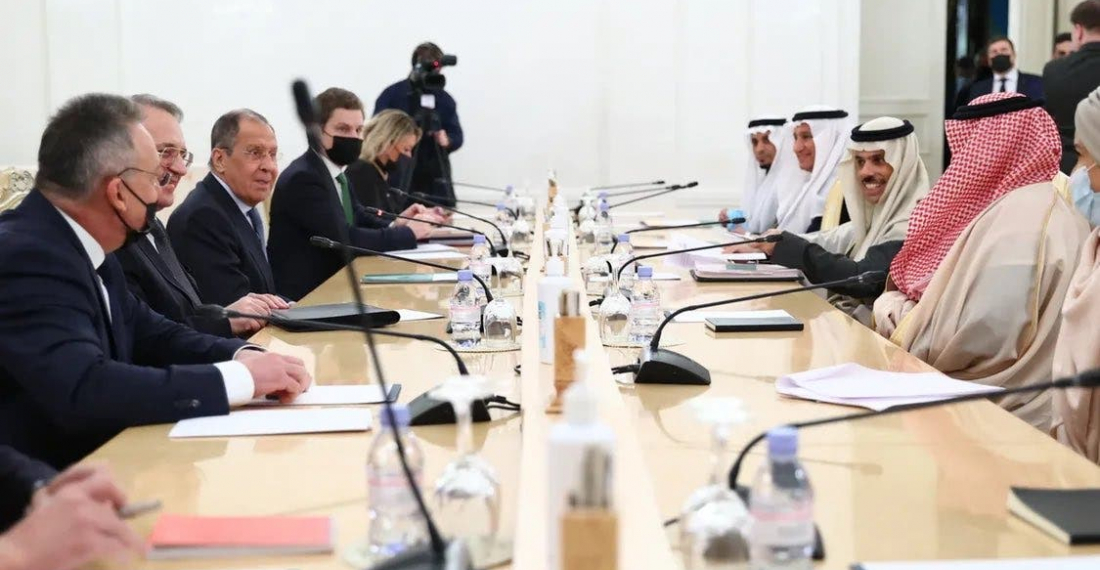Saudi Arabia’s Foreign Minister Prince Faisal bin Farhan on Thursday met in Moscow with Russian Foreign Minister Sergei Lavrov. Whilst the two sides emphasised positive trends in their bilateral relations, it was also obvious that there were important differences, not least on Iran.
At a joint press conference, Prince Faisal said “we look forward to making use of this [Saudi-Russian] relationship to coordinate positions and serve the common interests of the two countries.”
“We discussed extensively ways to develop and strengthen relations between the two countries in various fields, the most important of which are investment, development and exchange of technical expertise based on the historic visit of King Salman to Russia and President Putin’s visit to the Kingdom,” he added.
The Saudi foreign minister said one of the most important areas of cooperation between the two countries is the “cooperation under the umbrella of OPEC +, which contributed to energy stability during the difficult period of the year 2020 – which was affected by the coronavirus pandemic,” adding that this cooperation also contributed to protecting the global economic system.
Prince Faisal denounced Iran’s “interventions” in the Middle East region. The Saudi minister said that Iran’s proxy militias were obstructing a solution for the war in Syria, adding that the Iran-backed Houthi force in Yemen is obstructing peace efforts in that country.
On his part Sergei Lavrov had a somewhat different read of the situation. The website of the Russian Foreign Ministry quoted Minister Lavrov as saying:
"We are interested in a normal dialogue between Iran and the Arab countries in the Gulf. We want them to reach agreements on building trust and transparency in military affairs and on promoting cooperation in general. This is exactly the goal of our proposal to draft a security concept for the Gulf. The main task is to prevent attempts to undermine efforts to create an environment for this dialogue.
"Unfortunately, our American colleagues (at least, the current administration) have been doing all they can to prevent this dialogue. Interference in the internal affairs of sovereign states and imposition of ideological concepts on these countries are unacceptable. Nobody should be doing that. We are seeing that in this region the United States and its closest allies behave like a bull in a china shop. Unfortunately, Iraq, Libya and the attempt to destroy Syria have had extremely negative repercussions for the countries and peoples of this region.
"We discussed this in detail. I emphasised again that we understand the concerns of Saudi Arabia, including those linked with the developments around Iran. We realise that Saudi Arabia is worried about Tehran’s missile programme and its activities in various countries in the region. The conference that we suggest holding to discuss collective security in the Gulf may well embrace all these issues, as well as the concerns of the other participants, including Iran. The main thing is to build this dialogue on the foundation of genuine equality. All outside parties must help the sides reach a consensus rather than set them against each other.
"In January, Foreign Minister of Iran Javad Zarif is expected to visit Moscow. We discussed this issue with him and will continue reviewing it in the context of our current exchange of views with Faisal bin Farhan Al Saud."
Lavrov welcomed the recent rapprochement between the members of the Gulf Co-operation Summit at their al Ula Summit. He said:
"As for restoring the unity of the Gulf Cooperation Council, I believe all of its members deserve support. On the whole, we regard the results of the summit as very positive. I would like to emphasise that in addition to Kuwait, which actively promoted this initiative, Saudi Arabia also played a special role as the leading council member. It volunteered to host this summit. As you know, it took place in AlUla. This is an important step towards stabilising the Gulf area. Russia is not simply interested in this. We have promoted the concept of collective security in this region for many years. Of course, the decisions reached at the summit will promote conditions for serious, substantive discussions on these ideas and initiatives."






